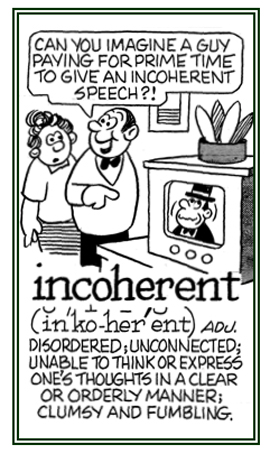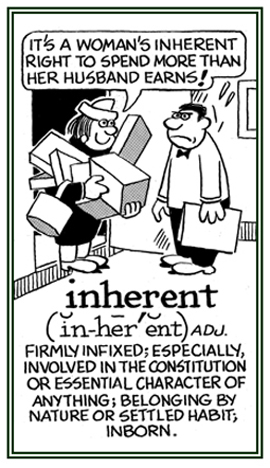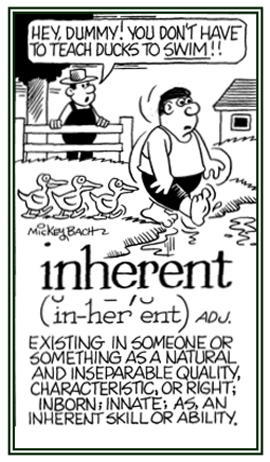her-, hes-
(Latin: stick to, cling to, cleave to)
1. Being only partly in existence or operation; incipient; especially, imperfectly formed or formulated.
2. Just begun and not yet properly developed.
2. Just begun and not yet properly developed.
1. Lacking connexion; incompatibility, incongruity of subjects or matters.
2. An insignificant relations in thought or language; incongruity, inconsistency; a lack of logical or rational consistency or congruity.
2. An insignificant relations in thought or language; incongruity, inconsistency; a lack of logical or rational consistency or congruity.
incoherent (in" koh HIR uhnt) (adjective), more incoherent, most incoherent
1. Descriptive of an object that is without physical cohesion; relating to parts which do not stick or cling together; unconnected, disjoined, loose: Thomas tried to glue the broken pieces of the vase together, but they turned out to be very incoherent because they wouldn't adhere to each other and so the pieces fell apart.
2. Relating to the formation of a group or series of incongruous parts; not connected or unified by any general principle or characteristic; inconsistent, uncoordinated: The package containing the sections of the cupboard seemed to be rather incoherent because none of the pieces fit together like the directions indicated.
3. A reference to thought and mental phenomena, language, literary compositions, etc.; in which there is no logical connexion or natural sequence of ideas: The essay was Natalie's first one and it turned out to be somewhat incoherent, but Mr. Smart helped her in getting her conceptions in a well-organized and understandable order.
4. Regarding someone’s thoughts which are not expressed in a clear or orderly manner: Because of his accident, Mr. Foster’s speech was very incoherent and he could not be understood when he tried to talk to other people.

© ALL rights are reserved.
Go to this Word A Day Revisited Index
2. Relating to the formation of a group or series of incongruous parts; not connected or unified by any general principle or characteristic; inconsistent, uncoordinated: The package containing the sections of the cupboard seemed to be rather incoherent because none of the pieces fit together like the directions indicated.
3. A reference to thought and mental phenomena, language, literary compositions, etc.; in which there is no logical connexion or natural sequence of ideas: The essay was Natalie's first one and it turned out to be somewhat incoherent, but Mr. Smart helped her in getting her conceptions in a well-organized and understandable order.
4. Regarding someone’s thoughts which are not expressed in a clear or orderly manner: Because of his accident, Mr. Foster’s speech was very incoherent and he could not be understood when he tried to talk to other people.

Go to this Word A Day Revisited Index
so you can see more of Mickey Bach's cartoons.
incoherently (adverb), more incoherently, most incoherently
1. Characterized by lacking orderly continuity, arrangement, or relevance; inconsistent.
2. Relating to the lack of normal clarity or intelligibility in speech or thought: Mack was incoherently talking because he drank too much whisky and wine at the party.
2. Relating to the lack of normal clarity or intelligibility in speech or thought: Mack was incoherently talking because he drank too much whisky and wine at the party.
1. A situation in which there is a lack of cohesion, connection, or harmony; not coherent
. 2. A condition that indicates the inability to think or to express one's thoughts in a clear or orderly manner.
. 2. A condition that indicates the inability to think or to express one's thoughts in a clear or orderly manner.
1. Lacking the ability to unite in a mass and to resist separation.
2. Without the capability of remaining, holding, or working together as a united whole.
2. Without the capability of remaining, holding, or working together as a united whole.
incohesive (adjective), more incohesive, most incohesive
Referring to a situation in which there is no working together to form a united whole.
inhere (verb), inheres; inhered; inhering
1. To exist, abide, or have something as an attribute, quality, etc., in a subject or thing.
2. To form an element of, or belong to the intrinsic nature of, something.
2. To form an element of, or belong to the intrinsic nature of, something.
inherent (in HIR uhnt, in HEHR uhnt) (adjective), more inherent, most inherent
1. Pertaining to that which exists in something ; such as, a permanent attribute or quality: Tom has an inherent, or deep-rooted, dislike of eating spinach ever since he was a child!
2. Descriptive of something that forms an element; especially, a characteristic or essential part of something: There are always some inherent dangers and risks in heart surgery, but doctors do their best to prevent any difficulties or bad results as much as they can.

© ALL rights are reserved.

© ALL rights are reserved.
Go to this Word A Day Revisited Index
2. Descriptive of something that forms an element; especially, a characteristic or essential part of something: There are always some inherent dangers and risks in heart surgery, but doctors do their best to prevent any difficulties or bad results as much as they can.


Go to this Word A Day Revisited Index
so you can see more of Mickey Bach's cartoons.
inherently (adverb), more inherently, most inherently
Resembling an intrinsic nature of that which is spoken of; that is indwelling or essential.
nonadhering (adjective), more nonadhering, most nonadhering
unadhering (adjective), more unadhering, most unadhering

